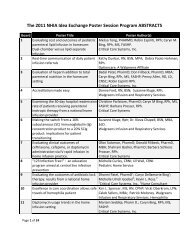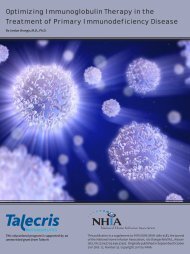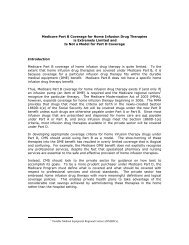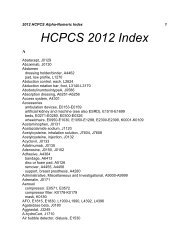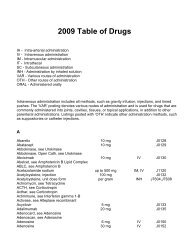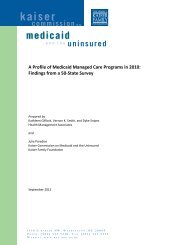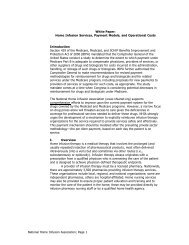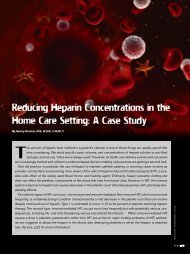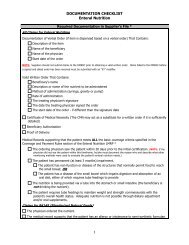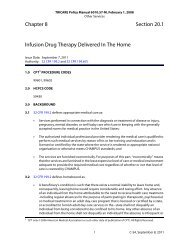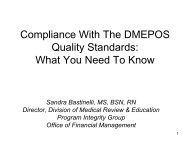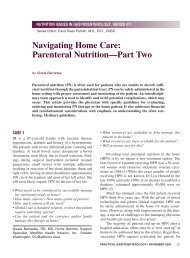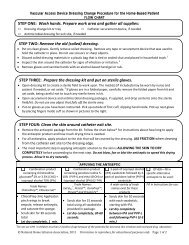Inadequacy of Coverage Under Medicare Part B and - NHIA
Inadequacy of Coverage Under Medicare Part B and - NHIA
Inadequacy of Coverage Under Medicare Part B and - NHIA
You also want an ePaper? Increase the reach of your titles
YUMPU automatically turns print PDFs into web optimized ePapers that Google loves.
A.S.P.E.N. POSITION PAPER/INADEQUACY OF COVERAGE UNDER MEDICARE PARTS B&D/4 OF 14<br />
this context that A.S.P.E.N. <strong>of</strong>fers these comments regarding the adequacy <strong>of</strong> <strong>Medicare</strong> <strong>Part</strong> B<br />
coverage for parenteral nutrition, <strong>and</strong> the likely inadequacy <strong>of</strong> <strong>Medicare</strong> <strong>Part</strong> D, as a<br />
prescription drug only benefit. As the pre-eminent organization for medical pr<strong>of</strong>essionals<br />
practicing in clinical nutrition, A.S.P.E.N. supports broadening the coverage under <strong>Medicare</strong><br />
for both parenteral <strong>and</strong> enteral nutrition.<br />
DEFICIENCIES IN MEDICARE PART D COVERAGE AS A HOME PARENTERAL<br />
NUTRITION BENEFIT<br />
In passing this legislation, it was the intent <strong>of</strong> Congress to provide a prescription drug plan that<br />
provided coverage beyond <strong>Medicare</strong> <strong>Part</strong> B, but not remove those benefits provided by<br />
<strong>Medicare</strong> <strong>Part</strong> B. However, <strong>Medicare</strong> <strong>Part</strong> D is constructed solely as a prescription drug benefit,<br />
with no provision to provide equipment, supplies or coverage for pr<strong>of</strong>essional services. These<br />
additional requirements make <strong>Medicare</strong> <strong>Part</strong> D’s adequacy to cover Parenteral Nutrition for<br />
beneficiaries not meeting <strong>Medicare</strong> <strong>Part</strong> B criteria suspect <strong>and</strong> highly unworkable. Solely<br />
reimbursing for the drug component <strong>of</strong> Parenteral Nutrition makes this benefit unworkable as<br />
coverage for patients requiring this therapy who do not meet <strong>Medicare</strong> <strong>Part</strong> B criteria. One can<br />
easily make the case that Parenteral Nutrition is not merely a drug therapy but a treatment<br />
modality requiring drugs, supplies, equipment <strong>and</strong> pr<strong>of</strong>essional services. The elimination <strong>of</strong><br />
any one <strong>of</strong> these requirements renders the provision <strong>of</strong> the other requirements moot <strong>and</strong><br />
insufficient to safely <strong>and</strong> adequately provide the needed care to these patients.<br />
Any patient who fails to meet <strong>Medicare</strong> <strong>Part</strong> B criteria <strong>and</strong> must rely on the <strong>Medicare</strong> <strong>Part</strong> D<br />
benefit will face significant obstacles <strong>and</strong> potential financial hardship if this is their sole<br />
coverage for home parenteral nutrition. The following case study is <strong>of</strong>fered to exemplify what a<br />
<strong>Medicare</strong> beneficiary may face in using the <strong>Medicare</strong> <strong>Part</strong> D “drug only” benefit through a PDP.<br />
• A 71-year-old-female with Inflammatory Bowel Disease (IBD) <strong>and</strong> resulting enterocutaneous<br />
fistula (high output intestinal leak) is admitted to a hospital for bowel rest, parenteral<br />
nutrition, <strong>and</strong> octreotide therapy. After assessment in the hospital <strong>and</strong> reduction in her<br />
fistula output, JR’s physician presents her with a plan for 4 weeks <strong>of</strong> conservative<br />
management <strong>and</strong> home parenteral nutrition to determine if fistula output can be further<br />
reduced without the need for surgery. If bowel rest is unsuccessful in reducing the fistula<br />
output, surgery is contemplated. She is informed that <strong>Medicare</strong> <strong>Part</strong> B will probably deny<br />
home parenteral nutrition under <strong>Medicare</strong> guidelines because her therapy will not require<br />
home parenteral nutrition for the minimum <strong>of</strong> 90 days <strong>and</strong> her impairment is not permanent.<br />
The patient lives on a fixed income consisting <strong>of</strong> social security <strong>and</strong> the earnings from her<br />
savings totaling $1356 per month before taxes, <strong>and</strong> she has <strong>Medicare</strong> <strong>Part</strong> D. She has limited<br />
financial resources <strong>and</strong> assets <strong>of</strong> approximately $12,000 consisting mostly <strong>of</strong> her savings,<br />
which do not entitle her to any financial assistance or low-income subsidy. The patient<br />
requests that her hospital case manager obtain an estimate from a home infusion provider <strong>of</strong><br />
her out <strong>of</strong> pocket cost for 4 weeks <strong>of</strong> home parenteral nutrition to assist her in making this<br />
decision.<br />
Comments:<br />
The patient will find that only those components <strong>of</strong> her parenteral nutrition classified as drugs<br />
will be covered under <strong>Medicare</strong> <strong>Part</strong> D. Some actual components <strong>of</strong> her parenteral nutrition<br />
such as multivitamins will not be covered <strong>and</strong> will have to be paid for separately. Also,



